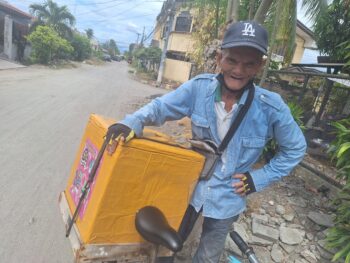MINHA is now ready to issue certifications, a development that has made local officials upbeat on the future of the food manufacturing industry in the area.
Presently, the country has no national halal standards or guidelines as well as a halal accreditation agency, prompting stakeholders to seek recognition from international certifying bodies to gain credibility and competence.
Mohammad K. Ali Suib, chair of the Muslim Business Forum (MBF) here, said halal trade has been existing for years but that the national government is not exerting serious efforts to further boost it.
“The irony is, despite having a large Muslim community, the Philippines is not a major player in the halal trade,” Mr. Suib lamented.
Quoting an MBF report, he claimed that Thailand, a Buddhist-dominated country, posted an annual average of at least $6 billion halal exports since 2001.
President Gloria Arroyo had issued memorandum order 201 directing the Departments of Trade and Industry, Agriculture, Science and Technology, Health, Tourism and the Office on Muslim Affairs to get their act together and come up with a singular halal standard in the country.
Mr. Suib said the move was aimed at strengthening the country’s halal industry as stakeholders have been looking abroad for recognition to certify.
The MBF succeeded in getting international recognition for MINHA from Halal Certification Authority of Australia, Halal Certification Authority International, Halal Certification Authority of Europe and Halal Certification Authority of the Pacific Islands, he added.
Two local chief executives in Central Mindanao lauded the setting up of MINHA, which shares an office with MBF.
Mayor Pedro Acharon Jr. expressed optimism the establishment of a halal certifying body in the city would further boost the local economy, particularly fishing industry and other firms involved in food processing.
“With MINHA around, I expect the market expansion of our tuna industry particularly in Middle East countries,” the mayor said.
Sarangani Gov. Miguel Rene Dominguez pledged to support the promotion of halal industry in the province.
“I encourage local government-private sector partnerships in developing our halal industry,” he said.
The governor urged the local firms to apply for certification with MINHA for them to access the huge global halal markets.
“We cannot afford to continue waiting for the national government,” he said of the prevailing ‘apathy’ of the national government in promoting halal trade in the country.
Mohamed El-Mouelhy, chair of Halal Certification Authority of Australia, said the creation of MINHA here opened up opportunities for local firms to access the 1.9 billion global halal consumers. The global halal industry is estimated at $150 billion annually.
Mr. El-Mouelhy was guest of honor and speaker during the MINHA launching ceremony.
In June, stakeholders in the country’s halal industry are slated to convene in Zamboanga City to establish a national halal guideline and a singular competent certifying agency, Mustapha Ismael, Department of Agriculture Halal Food Industry Development Committee chairperson, earlier said.
